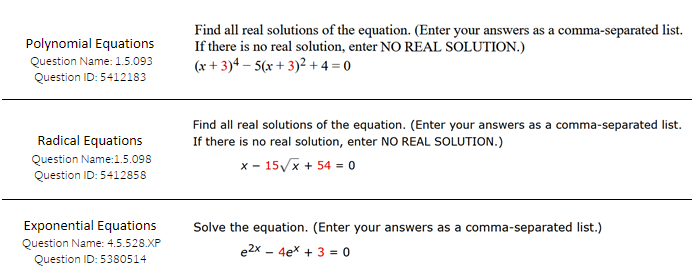In addition to helping students gain the skills needed to be successful in Calculus, a mindfully designed Precalculus course can also help address poor study habits, fill gaps in foundational knowledge, influence a student’s math mindset and introduce useful skills for solving difficult problems. However, careful planning is necessary to achieve these additional goals. Here are some strategies I use to set my Precalculus students up for future Calculus success using the online learning platform, WebAssign.
Strategies for promoting effective study habits
- Customize a template in WebAssign to incentivize working on assignments early. To do this, enable the option to provide extra credit, even as little as 5%, for work completed more than 24 hours before the due date.
- Give students the opportunity to advocate for themselves and encourage them to do so. I do this by reviewing the prerequisite skills from our corequisite course during the first week of the semester while at the same time leading mindful conversations about the purpose of the corequisite course. At the end of the week, students are given an assignment that includes an option to enroll in the corequisite course. Additionally, I make sure to thank the students who advocated for their needs.
Strategies for filling gaps in foundational knowledge
- Incorporate problems that provide practice of specific prerequisite skills and point them out to your students. For example, many of my students struggle to square a binomial. Therefore, I will proactively choose problems in each chapter that will provide us the opportunity to discuss this skill. These include*:

- Include review problems at the end of each homework assignment. These problems can include prerequisite skills and curriculum content. In addition to helping students practice their prerequisite skills, this strategy also provides the opportunity for extra practice on topics that may have been difficult initially.
Strategies for developing a positive math mindset
- Help students find and celebrate success. When your students see that you believe in them, they may slowly start to believe in themselves as well.
- Approach content in a way that provides a continual review. This can be done by using a function-based approach that starts off with topics such as transformation, domain, modeling, etc. You can then revisit each topic while covering the different families of functions. Students will feel more confident each time the topic comes up.
- Utilize the mindset modules provided in WebAssign, and assign them at appropriate times in the course. For example, assign the test preparation module a week before the first test. To view and add the mindset modules, click Edit Class Settings>Add Textbooks & Free Additional Content and select Cengage, Math Success Toolkit, ed. 1. For each topic, there are assignments that either utilize open-ended questions or auto-graded questions so that you can choose the format that best fits your needs. The current mindset modules available are:
-
- What is Growth Mindset?
- Reframing Failure
- Learning and Memory
- Effective Note Taking
- Navigating a Math or Stats Textbook
- Math and Test Anxiety
- Studying for Math and Stats Exams
- Academic Integrity
- Equity and Self-Advocacy
- Inclusion and Diversity
- Problem Solving in Math and Statistics
- How to Do Math and Statistics Homework
- Online Learning Strategies
Strategies for developing complex problem-solving skills
- Help students develop language fluency. For example, when covering functions, include difference quotient problems. These problems require students to think through work through a problem that is asked symbolically. I purposefully include difference quotient problems as the review problems at the end of various homework assignments since I know they will see this early in their Calculus course.
- Help students gain confidence manipulating an expression to put it in a form that is useful or simplified. Two great places to utilize this strategy are when working with complex numbers (multiply by the conjugate) and quadratics (completing the square).
- Introduce students to techniques that will be helpful when solving more difficult problems, like U-substitution. These can be pulled in at various times over the semester, such as when solving:

- Help students develop their problem-solving skills by utilizing the various Explore Its available in WebAssign.
I hope you can use some of these strategies to set your Precalculus students up for success, whether they’re planning on taking Calculus or not. You never know, you may even have given some students the confidence to take Calculus who previously would have avoided it!
*Referenced problems and their associated question name’s and ID’s are from Stewart Precalculus: Mathematics for Calculus 8e.

Tracy Zanolini is a Cengage Faculty Partner and Mathematics Instructor at Rowan Cabarrus Community College
Learn more about how WebAssign can help build student confidence and skills in your Precalculus course.

